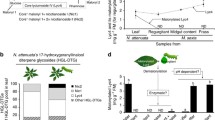Summary.
Larvae of the chrysomelid beetles Phaedon cochleariae and Gastrophysa viridula use iridoid monoterpenes for defense. The compounds are synthesized de novo in the glandular tissue and the reservoir. However, larvae feeding on leaves impregnated with thioglycosides of early precursors of iridoid biosynthesis such as the thioglycosides of 8-hydroxygeraniol, 8 and 9, rapidly accumulate in their defensive secretion. Thioglycosides combine a unique structural similarity to natural substrates with an exceptional chemical and biological stability against hydrolytic enzymes and can be, therefore, used to study transport phenomena of glycosides. The successful import suggests that the larvae possess, in addition to the de novo biosynthesis, the capability to sequester appropriate glycoside precursors that are transformed to iridoid monoterpenes in the reservoir. The uptake process displays a remarkable substrate selectivity, since the thioglycoside of geraniol 10 is not imported. From the two isomeric thioglycosides of 8-hydroxygeraniol, 8 and 9, the isomer 8 is preferred by a factor of ten. The data clearly support the existence of a highly selective transport system which enables the larvae to utilize plant derived terpenoid precursors in addition to their own de novo biosynthesis of iridoids.
Similar content being viewed by others
Author information
Authors and Affiliations
Additional information
Received 6 April 2001; accepted 8 June 2001.
Rights and permissions
About this article
Cite this article
Feld, B., Pasteels, J. & Boland, W. Phaedon cochleariae and Gastrophysa viridula (Coleoptera: Chrysomelidae) produce defensive iridoid monoterpenes de novo and are able to sequester glycosidically bound terpenoid precursors. Chemoecology 11, 191–198 (2001). https://doi.org/10.1007/PL00001851
Issue Date:
DOI: https://doi.org/10.1007/PL00001851




